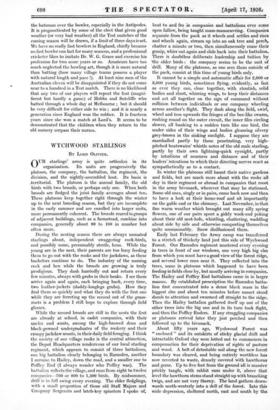CRICKET MENTALITY
FNGLISH interest in cricket does not even yet seem to - have reached its meridian, in "spite of subtraction' by lesser games played with balls that do not hurt. The coming matches between England and Australia—for ., England rather than Britain is the right word here- . are so stirring the public already before the Australians have landed on our shores that, as at a popular theatre, " advanced bookings " have begun on a large scale ; and the quality of the two teams, as well as the method of their selection, has greatly affected popular emotions on both sides of the world. • One reason is that the Austra- lians introduce novelty. They play the game more intensely than we do. Some queer and quaint examples may be given. In one of the matches played in Australia last year, a succession of new balls was called for ; and as soon as each arrived on the field, bowlers, known for their particular capacity to make the ball swerve in the air, were put on to bowl. This art, much practised by the throwers in American base-ball, can only be efficiently exercised while the seam is at its roughest and the rest of the sphere at its smoothest. The Australians invented what is wrongly called the American service at lawn tennis. They have developed beyond our mark that queer trick of delivering the cricket ball known as the googlie, though it was patented in England first. In the art of captaincy they have gone into details quite scorned in this country. The particular strokes, whether of strength or weakness, in every English player likely to appear in a representative eleven arc noted' down in a note book ; and when he appears at the wicket, the bowlers and the field are shifted to suit his idiosyncrasies. The record even of the umpires is the subject of an in- quisition.
A great amateur " Test player " said the other day that the mind of the Australian about to bat is quite different from the English mind. Though he should come in ninth wicket, he comes not lightheartedly, with the carelessness of a man not expected to do much, but conscious that the tail is as much a part of the organism as the head. He is as determined to make a great score as number one or two ; he knows he can on occasion make a century.
The difference, both of style and mentality, between English and Australian cricketers is the direct result of the sun. It is easier to bat in Australia than in England, and it is harder to bowl. The impression is that the ball comes off the pitch at an obtuser angle at Sydney than at Lord's. The light is usually better. Just as most sports- men can shoot snipe rising from a paddy field under an Indian sky, and very few hit the same bird on a brown Irish hillside, so, if in less salient degree, on the Antipodean cricket grounds. Other climatic conditions of a less precise sort perhaps contribute. The writer proved in his own case that he could drive a golf ball twenty yards further at Melbourne than at Rye ! The average of cricket in Australia, as indeed of lawn tennis, is higher than in Britain because it is a general rule that the better the conditions the more easily perfected the art. Of course the ability to play the games all the year round is a great source of superiority in technique. Nevertheless when all is said the most effective difference is in mentality. The Australian takes more trouble about the minutiae ; and if now and again, as in such details as the excess of new balls, the laws may be not strictly observed and the keenness may be overdone, that extra zeal is in itself admirable and a producer of new life in the game.
The danger to cricket, if not as a popular pastime yet certainly as an international game; is the' superiority of the batsman over the bowler, especially in the Antipodes. It is prognosticated by some of the elect that given good weather (or very bad weather) all the Test matches of the coming season will be drawn, if a limit of three days is set. We have no really fast bowlers in England, chiefly because no fast bowler can last for many seasons, and a professional cricketer likes to imitate Dr. W. G. Grace and exercise his profession for two score years or so. Amateurs have too much neglected the bowling art, though it is more natural than batting (how many village teams possess a player with natural length and pace !). At least nine men of the Australian eleven will be disappointed if they do not come near to a hundred in a Test match. There is no likelihood that any two of our players will repeat the feat (magni- ficent but hardly a game) of Hobbs and Sutcliffe who batted through a whole day at Melbourne ; but it should be very difficult for either side to win ; and it is nearly a generation since England won the rubber. It is fourteen years since she won a match at Lord's. It seems to be demonstrated that the children when they return to the old nursery surpass their nurses.



























































 Previous page
Previous page